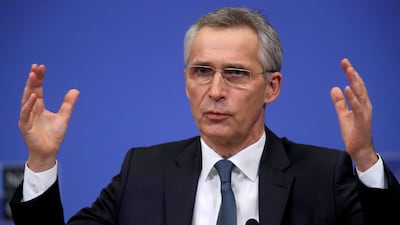Nato’s Secretary General on Monday encouraged members of the alliance to increase their defence spending to meet growing global threats.
Before a week-long meeting of defence ministers, Jens Stoltenberg said tht the alliance should increase its numbers in Iraq and questioned the withdrawal of troops from Afghanistan.
Mr Stoltenberg also called on members to consider making their own militaries carbon neutral.
Nato defence chiefs are to discuss topics from Afghanistan to Iraq and the increasing influence of Russia and China.
A change in atmosphere is expected from previous years after the threats from former US president Donald Trump to end America’s involvement in the 75-year-old alliance.
“This year will be a unique opportunity to start a new chapter for transatlantic relations,” Mr Stoltenberg said in Brussels.
“When we meet, I want to present leaders an ambitious agenda for transatlantic security and defence.”
His main call was for all Nato members to increase funding for deterrence and defence.
“Spending more together would demonstrate the strength of our commitment to Article 5 – our promise to defend each other – and it would contribute to fairer burden-sharing,” Mr Stoltenberg said.
He called for a more robust approach against the “global challenges” facing the alliance.
“China and Russia are at the forefront of an authoritarian push back against the rules-based international order,” Mr Stoltenberg said.
“So we should enhance our political dialogue and practical co-operation with like-minded partners to promote our values and protect our interests.”
With US President Joe Biden launching a global defence review for his country’s forces, it remains unclear how many troops America will keep in Iraq and the wider Middle East.
But Mr Stoltenberg suggested that the US should retain a strong military presence.
“Nato’s mission in Iraq is a key contribution to the fight against international terrorism," he said.
"I expect ministers will agree to launch an expanded mission, with more allied personnel training and advising.
“The mission will expand gradually in response to the situation. This follows requests from the Iraqi government so that together we can ensure that ISIS does not return.”
During the summit, defence ministers will discuss whether the 10,000 Nato troops should remain in Afghanistan while Taliban violence rages.
Mr Stoltenberg said that peace talks were fragile and “violence remains unacceptably high”, with continued Taliban attacks on civilians.
Last year, Mr Trump's administration agreed with the Taliban that foreign troops would leave Afghanistan by May 2021 in return for the insurgents cutting ties with Al Qaeda and opening peace talks with the Kabul government.
But Mr Biden's administration said it would review the deal, with the Pentagon accusing the Taliban of not meeting commitments to reduce violence.
Mr Stoltenberg has repeatedly insisted that Nato members must decide together on the future of their mission.
“We need to find the right balance between making sure not to stay longer than necessary but at the same time that we don't leave too early," he said.
"We should not end up in a situation where Afghanistan again becomes a platform or a safe haven for international terrorists."
On climate change, he said that Nato countries had to find the “gold standard on reducing emissions from the military sector”, and contribute to the goal of no carbon emissions.


